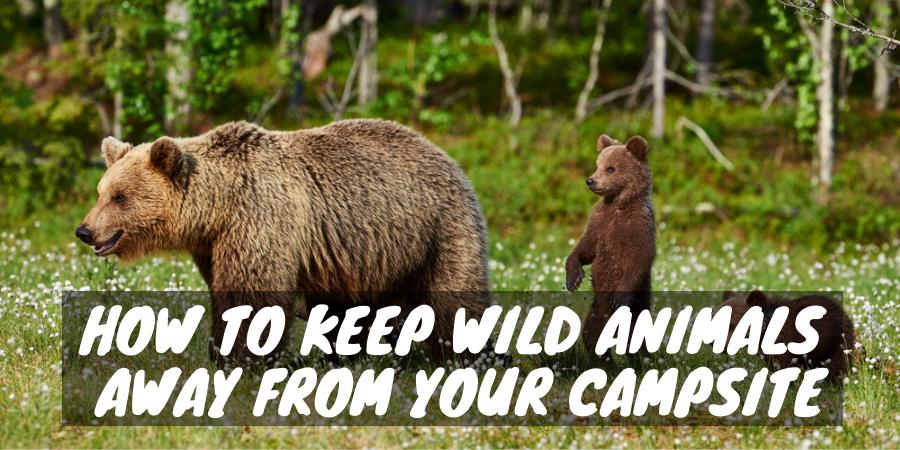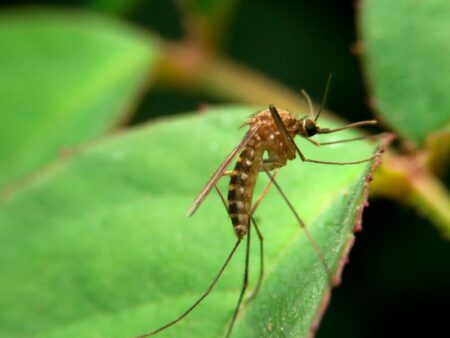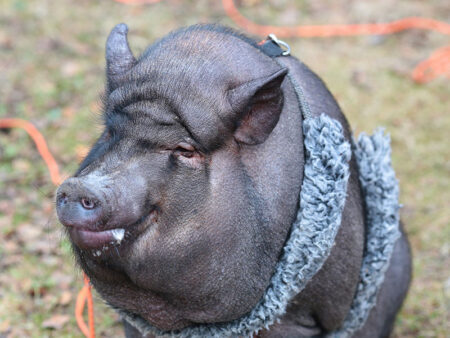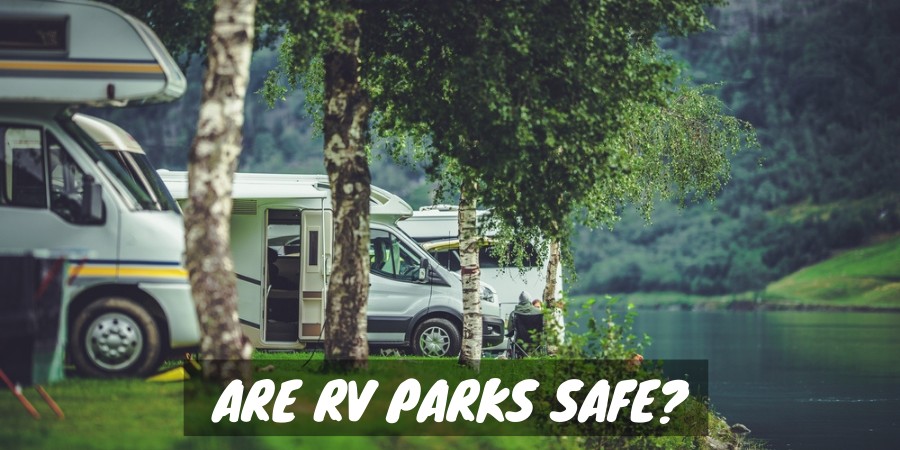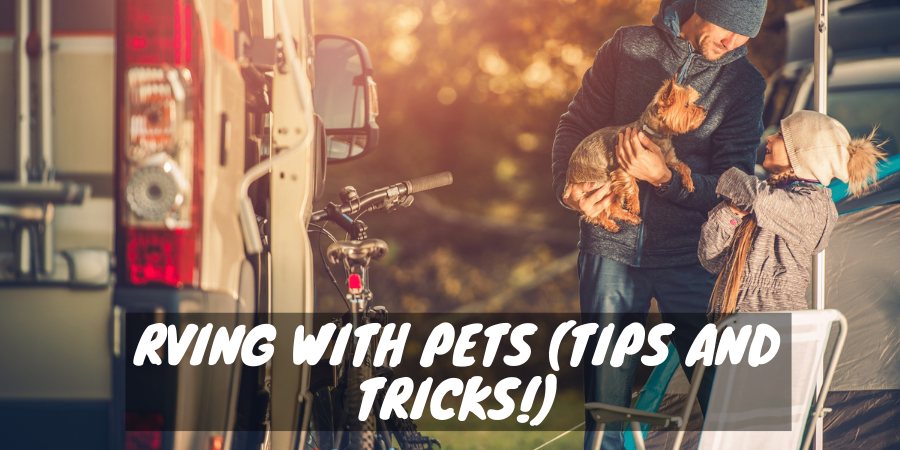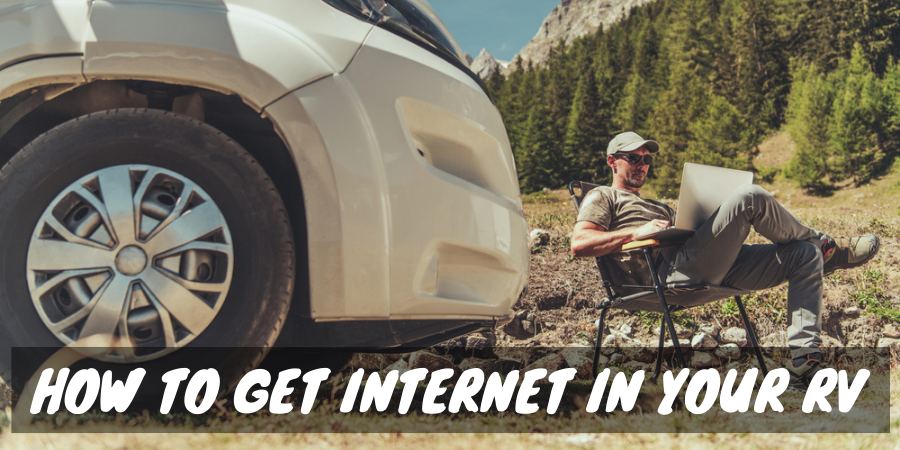When I go camping, I’m always mindful of the potential dangers, like unexpected visits from local wildlife. That’s why I’ve made it a point to learn various techniques to prevent wildlife from encroaching on my campsite, whether I’m staying in a tent or an RV.
Dealing with everything from small, bothersome raccoons to potentially dangerous bears is a key part of my camping preparations. I’ve learned what actions are safe and which ones to avoid to ensure my camping trip is both enjoyable and worry-free.
Below, I’ll share some valuable advice I’ve picked up from expert campers on how to effectively keep wildlife away from my campsite and maintain the natural order by keeping them in the wild.
The Best Ways to Keep Wild Animals Away From Your Campsite
Get to Know the Wild Animals Where You’ll Be Camping
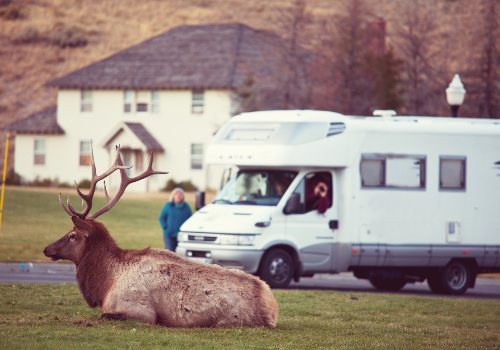
Like mosquitoes, opossums, raccoons, mice, birds, and squirrels, some wildlife are typical campsite guests no matter where in the country you visit.
Other areas have specific animals that are not only unique to the region but are often top predators that can be outright dangerous to encounter while camping, such as:
- Coyotes and wolves – Coyotes and wolves are opportunistic and will take advantage of sloppy campers who leave trash or food accessible.
- Bears – Bears love an easy meal, and certain human scents attract them, so keeping food locked up tight and washing up well are important if you’re in bear country.
- Panthers – A panther may lash out if you catch it poking around your campsite, especially if it has young to feed.
- Poisonous snakes – Rattlesnakes, copperheads, and cottonmouths are all dangerous and may come to your tent seeking warmth on cold nights, so keep that tent zipped tight.
- Alligators – Even a small alligator can snatch your pet or small child, and these guys are fast! Alligators can be nearly invisible when underwater only an inch, so always be vigilant near any body of water in the southern US.
- Deer, Elk, and Bison – Deer aren’t so cute when you learn they cause more deaths than any other wild animal in the US. Elk and bison can attack when they feel a threat, so take their presence seriously while camping.
- Scorpions, Spiders, and Bees – They may be small, but bees, scorpions, and spiders can cause real hurt when they swarm because you disturbed their nest or encountered them in your camping gear.
Do a quick online search for harmful animal species where you plan to camp. When you understand what creatures you may encounter, you can prepare ways to keep them away from your campsite.
Select a Campsite That Animals Find Unappealing
Choosing the right campsite is particularly crucial when tent camping compared to being in an RV, yet both situations require vigilance to prevent encounters with unwanted animals.
The best and easiest way to keep wildlife away from your campsite is to pick a spot with open ground and short or no grass, without piles of natural litter such as leaves, branches, or rocks. Also, choose a location that’s a safe distance from any lakes, rivers, swamps, or ponds.
Remember that animals love the cover of trees, tall grass, and forest debris and need regular water access.
The more open and flat the area is, the easier it is to spot larger animals so you can defend yourself if necessary. Open land also gives the animals a quick escape, so they feel less threatened and less likely to attack.
Having some trees nearby is handy, especially for tenters, so you can safely hang your food and supplies out of reach of hungry or curious animals.
Animals will use human-made pathways, so avoid setting up camp right next to trails, no matter how convenient it seems.
Stay 200-300 feet from any water source, as it reduces the number of mosquitoes around your tent or RV and won’t interfere with the animals who use it for daily hydration.
Don’t Let Animals Smell or Reach Your Food
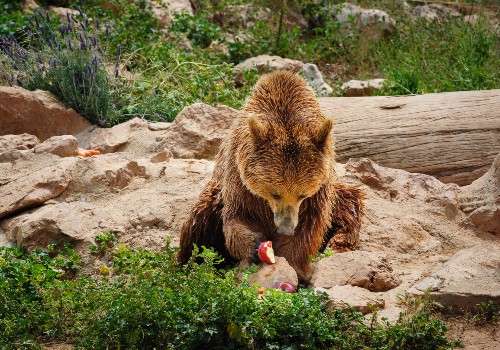
Cleanliness plays a massive role in keeping animals away from your campsite.
The more popular a camping location, the more likely the local wildlife will make a pitstop, as the animals know free and easy food awaits when campers are sloppy.
When you keep your campsite pristine between meals and secure your food items and trash, curious critters are less likely to stop by.
Food items also mean the cooking gear you made dinner on and any clothing that has grease or drips from the latest meal. It all smells lovely to all types of animals, from black bears to field mice.
For campgrounds with no secure trash receptacles or bear-safe lockers for food storage, you need to follow these rules:
Double bag all food (if you don’t have a cooler) and trash items and hang them at least 20 feet above the ground.
Bring plenty of paracords and tie a rock to one end to help you toss the rope over a high branch. Make sure the bag hangs 10 feet away from the trunk and 10 feet under the branch so animals can’t reach the food or trash directly from the tree.
If you can’t find a tree with branches that work, you can stretch a rope between two trees twenty or so feet apart, then hang your items in the middle of the two.
Never bury trash unless you plan to build a massive rock pile above it, as animals will quickly dig up anything that smells enticing.
As a last resort, use your vehicle to protect food and trash, but be aware that bears can easily grab and bend the framing around car doors to get inside if they smell something delicious.
Lastly, wash all cooking gear well, along with your hands. If any food gets on clothing, bag it and hang it from the tree with the food and trash until it’s time to depart.
Cook With Caution to Keep Wild Animals Away
Many animals, especially bears, and opossums, can smell food from very far away, so consider passing on the fresh meat for meals and opt for ready-to-eat meal kits when possible to decrease wildlife visits to your campsite.
While tempting to eat inside your tent, try to avoid it as it holds in any scents from food that can attract creatures while you sleep. If it’s raining and you must eat inside, try to air out the tent as soon as possible.
Mice and birds will visit to eat food scraps left in pots or on dishes and often leave behind some bodily waste. Always clean your items before and after use to make sure you wash away any traces of excrement so you don’t get sick.
You’re done eating and go to brush your teeth. Be aware that many animals find the scent of toothpaste irresistible, so rinse your mouth out well and pack your toothbrush and toothpaste into a safe location (in the car or hang your backpack from a tree.)
Remember that the more your campsite smells like “nature” and less like humans, the fewer animals will come nosing around.
Fun Fact: Some animals, like elk, deer, and mountain goats, are attracted to the salts in urine, so don’t relieve yourself anywhere near your campsite.
Deter Wild Animals with Lights and Noise
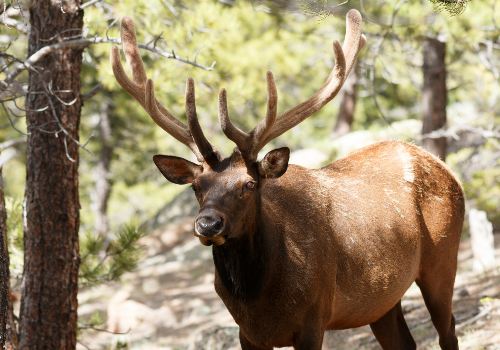
Nocturnal creatures like raccoons and coyotes prefer to scavenge under the cover of darkness, so the more light you can place around your campsite, the better.
Solar or battery-operated rope or string lights are a great option that makes your campsite more festive.
RVers should lay a string of lights under their camper’s perimeter to keep animals from hiding out underneath.
Everyone should place twinkling or blinking fairy lights around nearby trees, shrubs, or camp chairs to deter wildlife from approaching because they don’t like the flashing.
Most wild animals will avoid human voices or high-frequency noises, so hang around the campfire and chat or run an ultrasonic animal repeller to keep animals out of your area.
Use Scents to Repel Wild Animals from Your Campsite
Certain scents are unappealing to wildlife, especially the animals that can wreak havoc at your campsite.
Bring some fresh oranges or grapefruit, and after peeling and eating them, place the rinds around the perimeter of your campsite as a barrier.
Another trick is to bring along a box of inexpensive dryer sheets and form a circle around your tent or RV, placing a dryer sheet every two or three feet and using rocks to hold the sheets in place. Remember to dispose of the sheets properly before you leave the campsite.
Want to Connect With a Community of Over 1,078 RV Enthusiasts?
Animals and bugs, especially mosquitoes, avoid the scents of:
- Ammonia
- Citronella
- Lavender
- Coffee grounds
- Garlic
- Clove oil
- Vinegar
Consider spreading the liquid or essential oils around your campsite to deter pests. Some campers also swear by drying and burning coffee grounds to create a mosquito barrier.
Ways to Protect Yourself if Wild Animals Visit Your Campsite
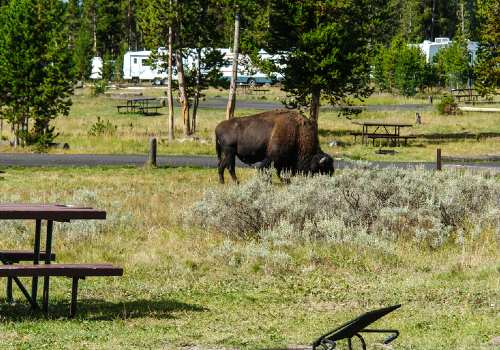
Whenever you’re camping, it’s always wise to be ready for dangerous encounters.
Even RVers in busy campgrounds can experience visits from creatures large and small.
I remember one night heading to the dumpster at a beach town RV park only to discover a small bear rummaging around inside who was none too pleased to see me! I was caught totally off-guard as there were no wooded areas within a half-mile of the park.
So, while I knew to be watchful for snakes and scorpions lurking under my camper stairs or hiding in my shoes left outdoors, seeing a bear didn’t enter my mind.
If I had been camping in a more rural area with lots of trees, I would have brought my bear spray on my jaunt to the dumpster. That experience taught me to always be on guard, no matter the location’s landscape.
Here are ways to scare off wildlife if you encounter them on your campsite or while on a hike:
BEAR – Bear spray and making continual noises like loud talking, clapping, or banging pots together are the best defenses to scare off bears.
A can of spray is pricey but worth the distance the liquid can shoot (around 30 feet), so you don’t have to get near.
SNAKES and ALLIGATORS – A long hiking stick or trekking pole is a great tool to shoo away snakes and alligators so you can keep your hands and feet clear of venomous fangs and sharp teeth.
BOBCATS and MOUNTAIN LIONS – If you have a big cat visit your campsite, the last thing you want to do is turn and run for cover. This will trigger their instinct to attack.
Maintain eye contact with the animal, start yelling, and slowly back away to safety until it moves along. Stand up tall and spread out your arms; the larger you appear, the more it will scare the cat.
If it’s too close for comfort, give your bear spray a short burst or throw a few rocks toward the animal to encourage it to leave.
Final Thoughts
When you know how to keep wildlife away from your campsite, you can spend more time enjoying nature and less time worrying about animals tearing up your camp looking for food.
Using the information above, you can prepare the right way for your next outdoor adventure and start new camping habits that are safer for both you and the local wildlife.
Remember that encounters with dangerous animals are possible while camping, so doing all you can to keep them away and protect yourself is a smart move!
9 Effective Ways to Protect Your Campsite From Predators (Video)
"Man cannot discover new oceans unless he has the courage to lose sight of the shore."
-- Andre Gide

